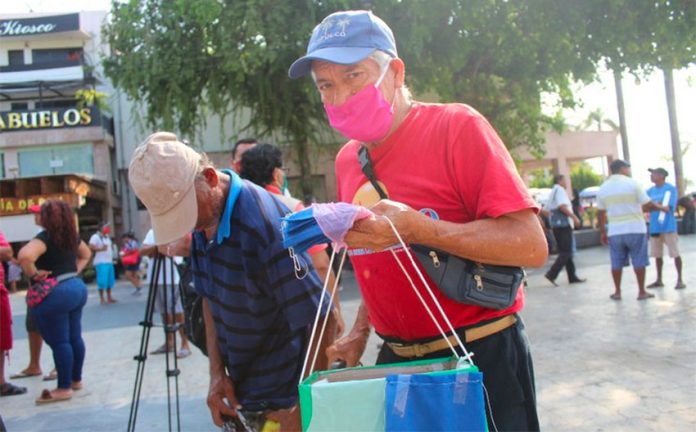With life on pause during the quarantine period, vendors in Mexico’s normally bustling informal street economy have had to adapt to shifting market trends in order to continue to make a living each day.
Street vendors across the country have turned to selling face masks to meet the growing demand for the personal protective equipment (PPE) and make up for the lack of demand for the products they normally sell.
Amadeo Vidal, 75, normally sells donuts in downtown Acapulco while his wife walks the beaches selling clothing, but they have changed tack in recent weeks.
She now works at making face masks while Amadeo heads to press conferences, roadblocks, protests and other events where people still gather to sell them for 5 pesos (US $0.21) a piece.
He carries the individually plastic-wrapped masks in a cardboard box and wears one himself to maintain sanitary standards.

Daniel Abundez of Cuernavaca has set up a similar operation with his dressmaker neighbor now that he can’t sell cosmetics in the mobile street markets called tianguis. She makes face masks with the fabric she normally uses to sew dresses while Daniel hits the streets to sell them.
“I at least sell enough [for us] to eat. Really, I can’t complain, but [I don’t earn] more than that. Just enough to survive,” he said.
A 30-year veteran street vendor in Mazatlán, Sinaloa, named Ángel Ricardo Meza has also found success selling face masks and antibacterial hand gel, despite seeing rising prices.
“Everything is expensive, everything has doubled, like a liter of alcohol that you could previously get for 37 or 38 pesos is now like 120 pesos,” he said.
Meza knows he is risking his health by setting up his temporary booth outside the now closed Pino Suárez market, but he’ll continue to do so as long as sales keep up.
“I’m taking a risk, but I have to earn some money. While it’s allowed, I’ll remain here,” he said.
Vendors in Gómez Palacio, Durango, and Torreón, Coahuila, have taken to selling face masks on the Puente Plateado bridge that connects the two cities divided by the Nazas River.
Both cities have mandated the use of face masks in public and health authorities have set up a screening checkpoint on the bridge, so vendors are able to sell the masks to drivers for 15-100 pesos, depending on the quality.
The demand for PPE on the street has grown so high that the business is attracting even those who don’t normally rely on selling to get by.
One man in Mexico City whose normal job is fighting as a masked luchador named El Hijo del Espectro Jr. has also joined the face mask market, obviously adding a bit of Mexican wrestling flair by designing them after the mask he wears in the ring.
“Just in March I had 12 dates set in various arenas — none of them happened — and in April a dozen more. That’s why we got to looking for another way to move forward with something that can help people and be decorative at the same time,” he said.
But unlike the street vendors walking along rows of idling cars, the luchador is using the influence of his wrestling persona to promote the masks, selling them via his Facebook page and other social media accounts.
Sources: La Jornada (sp), El Sol de Cuernavaca (sp), El Sol de Mazatlán (sp), El Sol de La Laguna (sp) Milenio (sp)
